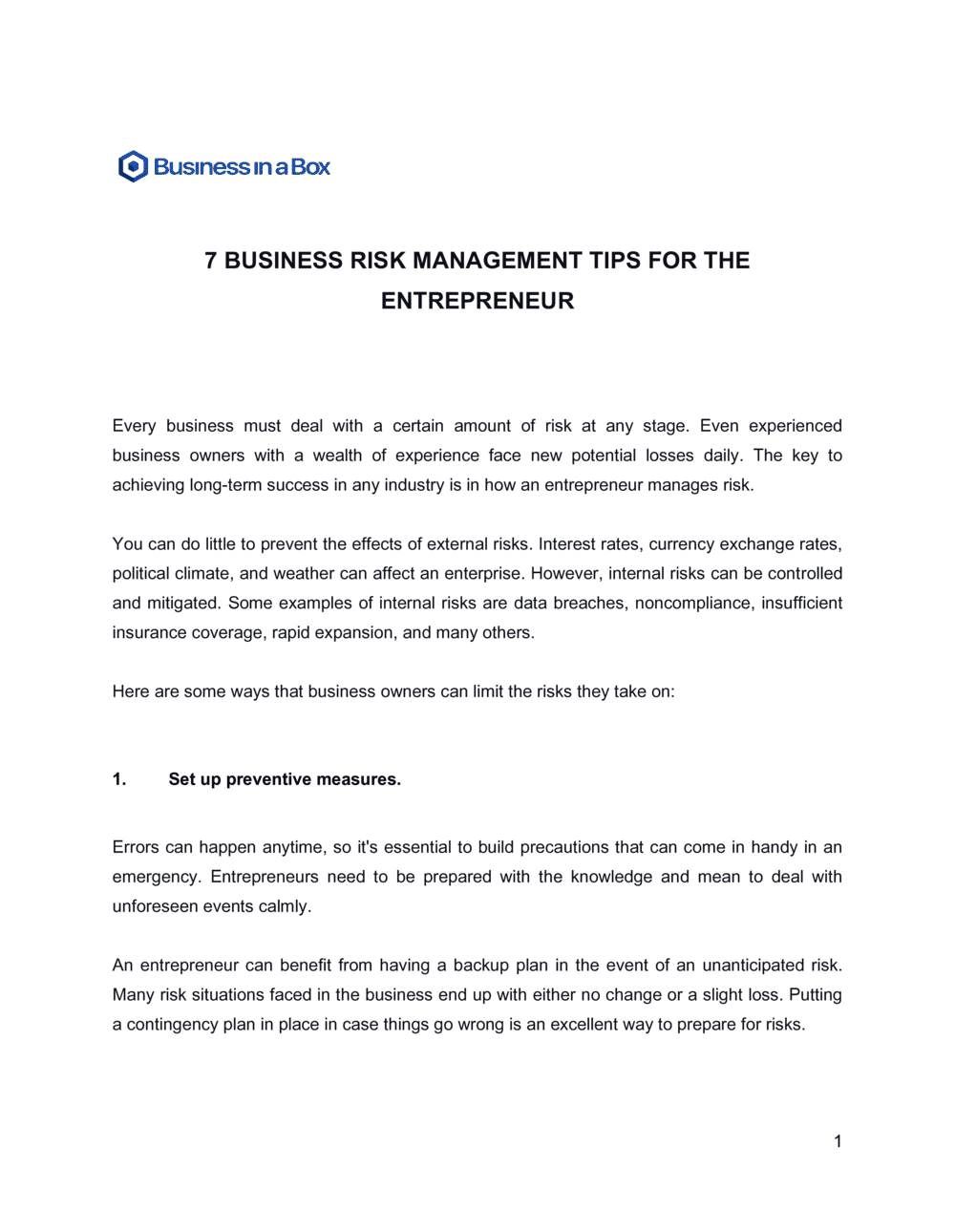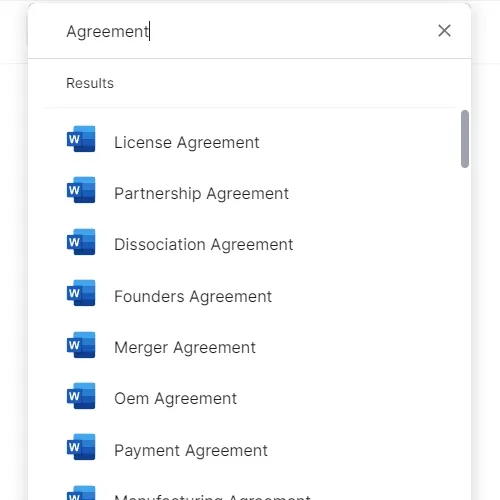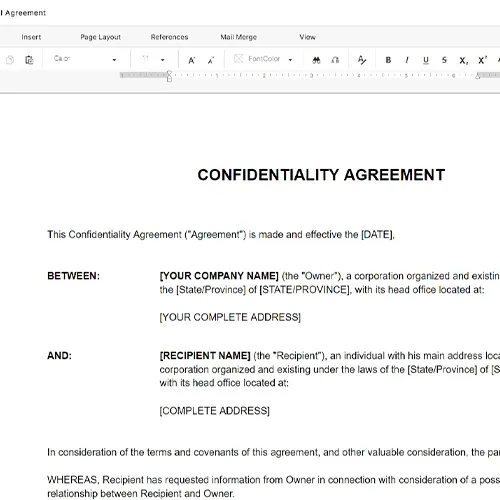7 Business Risk Management Tips For The Entrepreneur Template

Document content
This 7 business risk management tips for the entrepreneur template has 3 pages and is a MS Word file type listed under our business plan kit documents.
Sample of our 7 business risk management tips for the entrepreneur template:
7 BUSINESS RISK MANAGEMENT TIPS FOR THE ENTREPRENEUR Every business must deal with a certain amount of risk at any stage. Even experienced business owners with a wealth of experience face new potential losses daily. The key to achieving long-term success in any industry is in how an entrepreneur manages risk. You can do little to prevent the effects of external risks. Interest rates, currency exchange rates, political climate, and weather can affect an enterprise. However, internal risks can be controlled and mitigated. Some examples of internal risks are data breaches, noncompliance, insufficient insurance coverage, rapid expansion, and many others. Here are some ways that business owners can limit the risks they take on: Set up preventive measures. Errors can happen anytime, so it's essential to build precautions that can come in handy in an emergency. Entrepreneurs need to be prepared with the knowledge and mean to deal with unforeseen events calmly. An entrepreneur can benefit from having a backup plan in the event of an unanticipated risk. Many risk situations faced in the business end up with either no change or a slight loss. Putting a contingency plan in place in case things go wrong is an excellent way to prepare for risks. Create an emergency fund for unexpected situations where you could end up with less capital than you had planned. One of the most important things an entrepreneur can do for the survival and success of their company is to take precautions. Do not procrastinate about risk. Managing risk is a demanding process, especially for new entrepreneurs. As a result, it is easy to feel compelled to postpone some areas of risk management. We recommend that young business owners resist this temptation and begin working on their risk management responsibilities immediately. Making tough choices quickly rather than later is wise, as procrastinated risks can grow considerably. Putting off making these judgments and choices can reduce a business's future flexibility and increase the associated risks. Get familiar with risk evaluation. The most effective risk management strategy is preparation. Having a plan in place to deal with potential dangers is essential. The process starts with a careful assessment of the potential risk. Contingency and recovery plans and measures to take in the event of specific risks should all be discussed during the evaluation. It's easier to prioritize concerns and decide which ones can wait when working with a reference point. An entrepreneur should consider the current implications of the risk
3,000+ Templates & Tools to Help You Start, Run & Grow Your Business

Document content
This 7 business risk management tips for the entrepreneur template has 3 pages and is a MS Word file type listed under our business plan kit documents.
Sample of our 7 business risk management tips for the entrepreneur template:
7 BUSINESS RISK MANAGEMENT TIPS FOR THE ENTREPRENEUR Every business must deal with a certain amount of risk at any stage. Even experienced business owners with a wealth of experience face new potential losses daily. The key to achieving long-term success in any industry is in how an entrepreneur manages risk. You can do little to prevent the effects of external risks. Interest rates, currency exchange rates, political climate, and weather can affect an enterprise. However, internal risks can be controlled and mitigated. Some examples of internal risks are data breaches, noncompliance, insufficient insurance coverage, rapid expansion, and many others. Here are some ways that business owners can limit the risks they take on: Set up preventive measures. Errors can happen anytime, so it's essential to build precautions that can come in handy in an emergency. Entrepreneurs need to be prepared with the knowledge and mean to deal with unforeseen events calmly. An entrepreneur can benefit from having a backup plan in the event of an unanticipated risk. Many risk situations faced in the business end up with either no change or a slight loss. Putting a contingency plan in place in case things go wrong is an excellent way to prepare for risks. Create an emergency fund for unexpected situations where you could end up with less capital than you had planned. One of the most important things an entrepreneur can do for the survival and success of their company is to take precautions. Do not procrastinate about risk. Managing risk is a demanding process, especially for new entrepreneurs. As a result, it is easy to feel compelled to postpone some areas of risk management. We recommend that young business owners resist this temptation and begin working on their risk management responsibilities immediately. Making tough choices quickly rather than later is wise, as procrastinated risks can grow considerably. Putting off making these judgments and choices can reduce a business's future flexibility and increase the associated risks. Get familiar with risk evaluation. The most effective risk management strategy is preparation. Having a plan in place to deal with potential dangers is essential. The process starts with a careful assessment of the potential risk. Contingency and recovery plans and measures to take in the event of specific risks should all be discussed during the evaluation. It's easier to prioritize concerns and decide which ones can wait when working with a reference point. An entrepreneur should consider the current implications of the risk
Easily Create Any Business Document You Need in Minutes.

Access over 3,000+ business and legal templates for any business task, project or initiative.

Customize your ready-made business document template and save it in the cloud.

Share your files and folders with your team. Create a space of seamless collaboration.
Templates and Tools to Manage Every Aspect of Your Business.
Business in a Box Covers Every Business Department
Includes 16 Types of Business Documents You Need
and Achieve Your Business Goals Faster.
